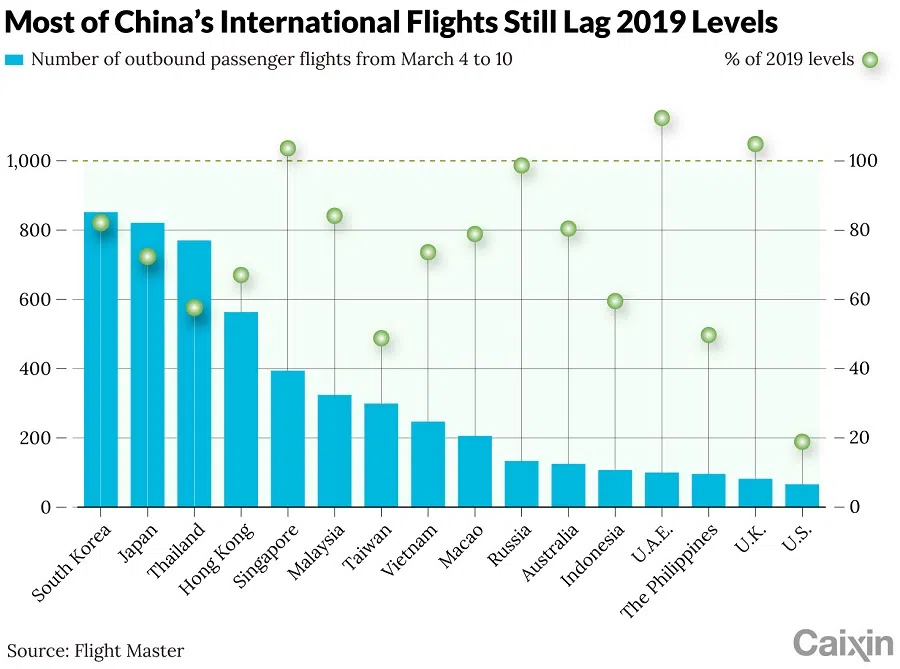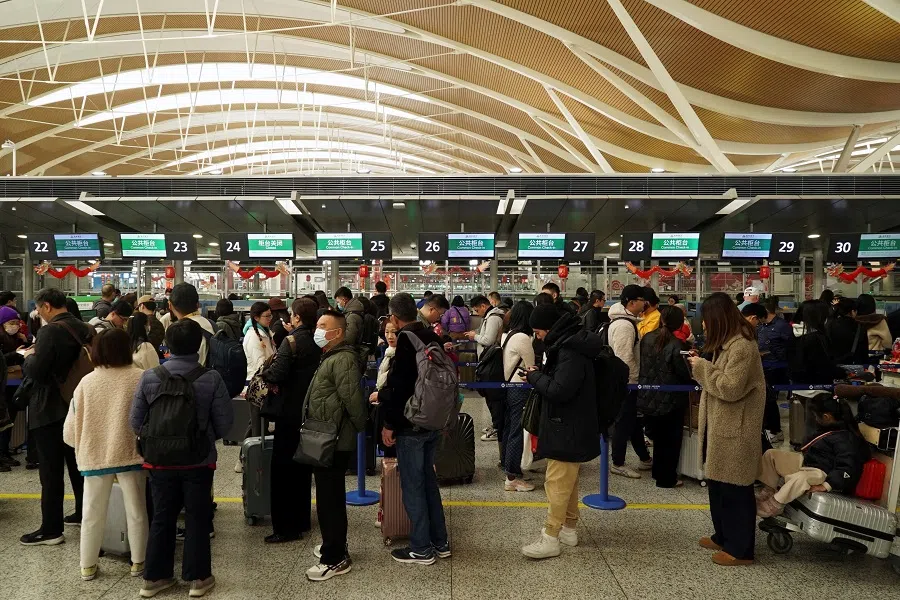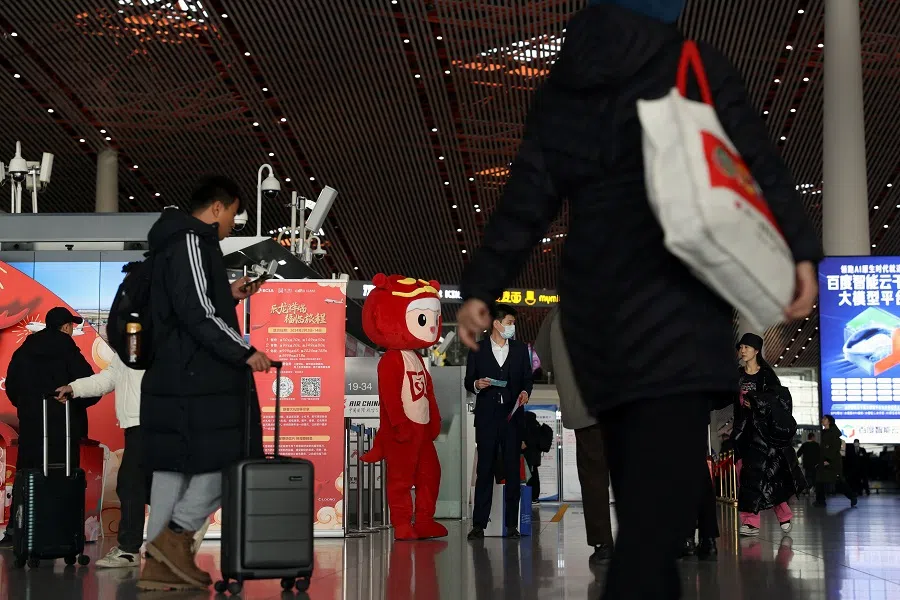China targets payments problem to win over foreigners
Despite China waiving visa requirements for citizens from over a dozen more countries and making local digital payment services more international-user friendly, flights and the flow of visitors from countries such as the US are still nowhere near 2019 levels.

(By Caixin journalists Sun Yanran, Bao Yunhong, Guan Cong and Anniek Bao)
Step by step, China has been encouraging more foreigners to enter the country since reopening after the pandemic, including waiving visa requirements for citizens from over a dozen more countries and making local digital payment services more international-user friendly. But tourists are not biting, at least not like they used to.
It has been more than a year since Beijing began allowing international travel en masse, but still flights and the flow of visitors from countries such as the US are nowhere near 2019 levels. Sour relations with the West and years of strict "zero-Covid" curbs are partly responsible for the sharp reduction in the number of visitors to China.
But there are also pre-existing hurdles for foreigners that the government and local businesses are trying to knock down.
Weeks before departing for a trip to China, tourist Knut Anders Finnset scouted blogs and online forums for tips for travelling on the mainland. Finnset told Caixin he found advice that he otherwise "wouldn't have known about", such as to download the international version of Alipay and link it with his credit cards. But he encountered problems using the mobile payments app during this visit in November.
Wang Yan, an overseas-born Chinese, ran into trouble as soon as he got off the plane: Poor international roaming signal meant he was unable to use the mobile payment system needed to buy a subway ticket. Instead, Wang took a taxi to his hotel, but when he tried to pay in cash the driver had no change.

Online taxi-hailing has become widely popular across China, while it is considerably harder to flag down a taxi on the street and pay with cash in most major cities.
China's payment platforms have been ramping up efforts to streamline their services to allow easier access for foreign visitors. These platforms are used by companies such as ride-hailing giant Didi.
... commercial banks and nonbank payment institutions have since late last year been encouraging more businesses - especially those at airports, train stations and major business districts - to accept foreign bank cards.
Digital payments
Over the three years during Covid-19, China rolled out a comprehensive digitalised information network, where daily activities such as mobile payments, online shopping, reserving restaurants or booking hotels can be completed with a few touches on apps like WeChat or Alipay. It has not only put in-person ordering, pay-by-cash transactions out of the picture, but also out of the option for many foreign visitors.
Now, following a push by the central bank to slash payment barriers for foreign users, commercial banks and nonbank payment institutions have since late last year been encouraging more businesses - especially those at airports, train stations and major business districts - to accept foreign bank cards.
The country's two digital payment behemoths, Alipay and WeChat Pay, have also been instructed to up transaction limits and simplify verification procedures. Earlier this month, they joined forces with central bank-backed NetsUnion Clearing Corp. (NUCC) to optimise the use of foreign bank cards and digital wallets on the Chinese mainland.
NUCC is a specialised clearinghouse designed for processing online payments initiated by nonbank payment platforms, such as Alipay and WeChat Pay, that involve bank accounts.

The trio aim to allow international users to use overseas cards with local payment systems more easily and ensure interoperability between the systems and foreign digital wallets, sources with knowledge of the matter told Caixin.
So far, Alipay and WeChat Pay have allowed users of 13 overseas online wallets to make payments on the mainland, Zhang Qingsong, a deputy governor of the People's Bank of China, said at a press briefing on 1 March.
Transport roadblocks
Transportation could be the first hurdle for foreign visitors after stepping into the country. Although most restrictive policies imposed during the pandemic have been removed, the palate for identity verification capability has largely remained in place.
Beijing's subway system started requiring IDs for ticket purchases in 2022. Chinese residents are able to swipe national ID cards while purchasing tickets through self-service kiosks. Foreign passport holders that do not have a residence permit have to get tickets from stations' service windows, which are often unstaffed, a representative from the European Union Chamber of Commerce in China told Caixin. Following the easing of pandemic controls, some Beijing subway stations have since removed the requirement.
Nicole Chang, a Singaporean who visited China from Paris this month, said that while she was able to link her credit card to WeChat Pay, she could not pay at the ticket machines in subway stations in Beijing and Shanghai, and had to purchase them in-person from the staff.

Hailing a taxi by the side of the road is also a thing of the past. Online hailing platforms operated by tech giants like Beijing Didi Chuxing Technology Co. Ltd. have replaced it with an app that requires a few taps and allows users to pick from various types of vehicles.
Users are now able to register accounts on the Didi app with overseas numbers and link to international cards including MasterCard, Visa and JCB, the company told Caixin. The chat box function with drivers also enables real-time translation.
... some Western visitors are concerned that by setting up accounts with services like Alipay and WeChat Pay they might risk compromising personal privacy and data security.
But setting up an account on these apps has typically entailed lengthy verification processes and user experiences vary widely. Many foreigners told Caixin that after the pandemic, identity authentication for payment software suddenly became more difficult than before.
Filipe Porto, a Brazilian scholar of International Relations, had to re-verify for WeChat after returning to China earlier this year following the pandemic. He tried and failed several attempts to verify his identity for the app and eventually used Alipay.
But some Western visitors are concerned that by setting up accounts with services like Alipay and WeChat Pay they might risk compromising personal privacy and data security.
In an attempt to stem these concerns, WeChat has introduced a tiered verification system where international users can link their foreign bank cards for payments up to a specified limit without requiring full identity disclosure.

"I made sure I had enough cash with me when landing in China, only to realise it can't be spent anywhere," Finnset told Caixin. Many merchants now only accept payments through QR codes, and do not have change prepared when foreign tourists try to pay with cash.
Foreign cards may also fail to work through Alipay and WeChat Pay in some scenarios. "I can buy subway tickets with international credit cards, but can't pay for a shared bike," Porto said.
Similarly, Chang told Caixin that she was unable to pay for the fare for a taxi ride and that WeChat Pay would have problems at select beverage shops.
Alipay is adding a new multilingual feature that will allow the use of overseas digital wallets to pay bus fares.
Inbound tourism
Foreign Minister Wang Yi announced on 7 March that China would expand its visa-free policy to six more European countries on a trial basis, namely Switzerland, Ireland, Hungary, Austria, Belgium and Luxembourg. From 14 March to 30 November, ordinary passport holders from these countries will be able to enter China without a visa and stay for up to 15 days.
China in December began offering visa-free entry to France, Germany, Italy, Spain, the Netherlands and Malaysia, and permanently waived visa requirements for citizens from Thailand. It also in February doubled the visa-free period for travellers from Singapore to 30 days.
The favorable policies are necessary, as China has fallen far down the list of holiday destinations, according to tourism industry experts.

People have been disregarding China as a destination for their next trip, said Zhou Xiaoguang, general manager of Guilin Tang Dynasty Tours Co. Ltd.
High inflation and rising living costs are also depressing demand for long-distance travel for global economies, said Cheng Gongchao, chief researcher at the research institute affiliated with Tongcheng Travel, "Travellers are pinching their pennies too."
Simple improvements to international tourism services could help, such as providing foreign language services.
In the first half of last year, there were 477,800 inbound visits received by China's travel agencies, compared with nearly 8.6 million in the same period in 2019, before the Covid-19 pandemic, according to Xinhua News Agency, citing data from the Ministry of Culture and Tourism.
Zhang Fan, general manager of an inbound travel agency that mainly serves travellers from Europe and the US, told Caixin that its orders from 2023 stood at 12% of that in 2019. Most of its peers also saw order volumes slimmer than one-fifth of what they used to see, he said.
Simple improvements to international tourism services could help, such as providing foreign language services. In one effort to knock down the language barrier, the Shanghai Municipal Government in January launched a trial of an international service platform to provide policy information, information services and lifestyle guides to foreigners visiting and living in Shanghai. It also set up domestic and overseas social media accounts.

Travel platforms are also trying to provide more content assistance. In September, Ctrip, China's largest online travel agency, launched the China Travel Guide on its international platform Trip.com.
Alipay is also adding a new multilingual feature that will allow the use of overseas digital wallets to pay bus fares.
Shen Jiani, a senior researcher at the Ctrip Research Institute, told Caixin that to improve the quality of inbound tourism services, attention should be paid to improving the foreign language proficiency and international reception capabilities of domestic tour guides and foreign-related tourism service personnel in places such as scenic spots, hotels and travel agencies.
Ctrip also launched an inbound tourism revitalisation plan last year, including building an inbound tourism service platform, launching an e-commerce support plan, talent training, and product release of the top ten inbound tourism routes. The company is aiming to increase the number of inbound tourists it serves in 2024 by 150% compared with 2019.
Zhou, of Tang Dynasty Tours, believes that China will see a recovery in inbound tourism this year compared to 2023, but only to around 30% to 40% of the pre-pandemic level.
Zou Xiaotong, Li Rongqian, Du Zhihang contributed to the story.
This article was first published by Caixin Global as "In Depth: China Targets Payments Problem to Win Over Foreigners". Caixin Global is one of the most respected sources for macroeconomic, financial and business news and information about China.





